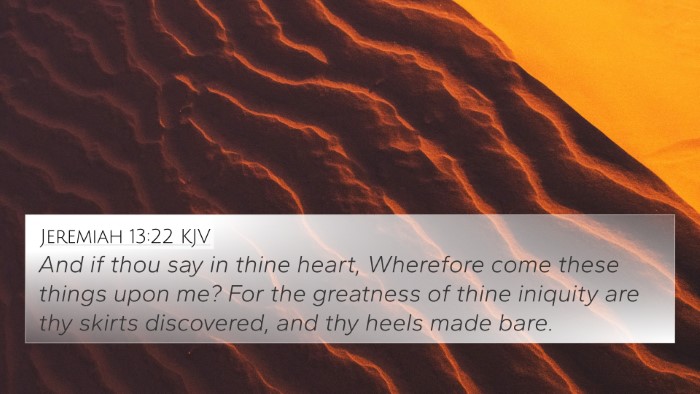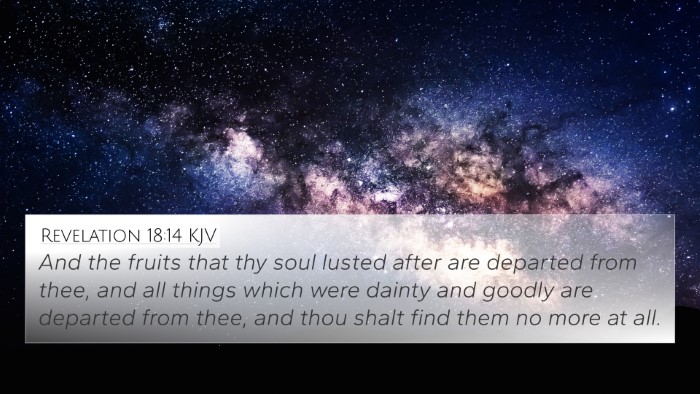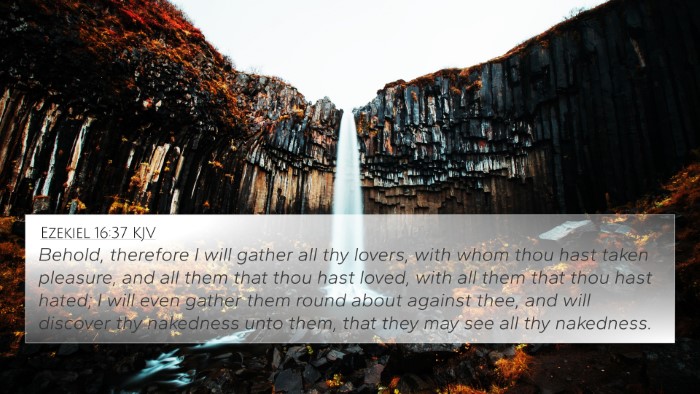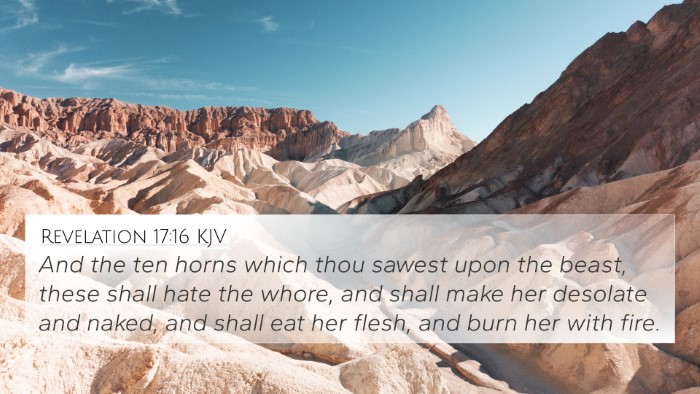Ezekiel 23:26 - Summary and Interpretation
The verse Ezekiel 23:26 states: "And they shall strip thee out of thy clothes, and take away thy fair jewels." This scripture is part of a prophetic message delivered by Ezekiel that employs vivid imagery to convey the fall of Jerusalem and the fate of its people. The meaning of this verse can be explored through the insights of prominent public domain commentaries.
Context and Background
Ezekiel was a prophet during the Babylonian Captivity. This particular chapter presents allegorical representations of two sisters, Oholah and Oholibah, who symbolize Samaria and Jerusalem, respectively. The imagery used throughout this chapter is particularly harsh and dramatic, emphasizing the spiritual unfaithfulness of the Israelites.
Verse Interpretation
The verse shows the stripping away of adornment and beauty, which can be interpreted as a loss of dignity and status due to sin and infidelity to God. Below are combined insights from Matthew Henry, Albert Barnes, and Adam Clarke:
- Matthew Henry: He emphasizes that the “clothes” symbolize the outward glory and beauty, representative of Israel’s covenant relationship with God. Their fall illustrates the consequences of spiritual adultery.
- Albert Barnes: Barnes expands on the idea that the taking away of "fair jewels" signifies the loss of precious things — both material and spiritual — resulting from divine judgment due to the nation's disobedience.
- Adam Clarke: Clarke interprets the action of stripping as God's judgment against idolatry, suggesting that the text reflects God’s displeasure with Israel's unfaithfulness, leading to their disgrace.
Spiritual Themes
The themes within Ezekiel 23:26 can be applied to various Biblical lessons, relating to sin, judgment, and restoration. The concepts of stripping and loss can also symbolize a deeper spiritual truth: the danger of turning away from God.
Related Bible Cross-References
- Isaiah 3:24: This verse also speaks of the loss of beauty as a consequence of moral decay.
- Lamentations 1:10: Reflects on how the enemy has taken from Jerusalem, offering a parallel of loss and desolation.
- Ezekiel 16:39: Depicts a graphic representation of judgment for unfaithfulness, reinforcing the message in Ezekiel 23.
- Jeremiah 13:22: Connects the themes of disgrace and loss associated with disobedience to God.
- Hosea 2:3: Here, God declares a stripping away resulting in vulnerability due to Israel's unfaithfulness.
- Micah 1:11: Focuses on the fact of devastating loss as a consequence of failing to uphold God's covenant.
- Revelation 3:17-18: Speaks of spiritual nakedness and the admonition to seek true riches from Christ, connecting with the loss portrayed in Ezekiel.
- Matthew 6:19-20: Advocates for the pursuit of heavenly treasures rather than earthly adornments.
- James 4:4: Addresses spiritual adultery, paralleling the themes of loyalty and fidelity embodied in Ezekiel’s metaphor of the two sisters.
- Romans 1:21-23: Contemplates the consequences of forsaking God, leading to a loss of divine beauty and favor.
Thematic Connections
Through these connections, we see the prominent Biblical theme of fidelity versus unfaithfulness, reflecting God's call for His people to remain true to their covenant. The stripping away of adornments parallels other scriptural illustrations that emphasize the gravity of turning away from God's ways.
Tools for Bible Cross-Referencing
To fully understand the implications and connections found in scriptures like Ezekiel 23:26, effective tools for Bible cross-referencing are essential:
- Utilizing a Bible concordance to locate terms and concepts across different passages.
- Implementing a cross-reference guide to explore thematic ties and biblical principles.
- Engaging in cross-reference Bible study methods to deepen understanding.
Conclusion
In conclusion, Ezekiel 23:26 serves as a stark reminder of the dire consequences of forsaking God, using metaphorical language that illustrates loss, judgment, and the need for repentance. The interconnection of scripture, when explored through the lens of comparative analysis and thematic studies, opens a pathway to a richer understanding of God's word.
Incorporating cross-referencing into one's study can enhance the comprehension of individual verses, revealing deeper insights about God's character, justice, and mercy throughout Biblical history.













